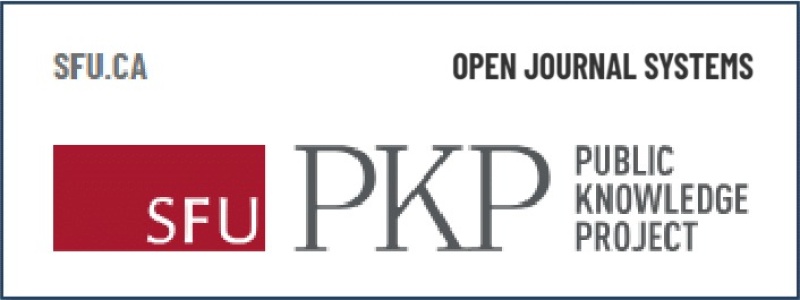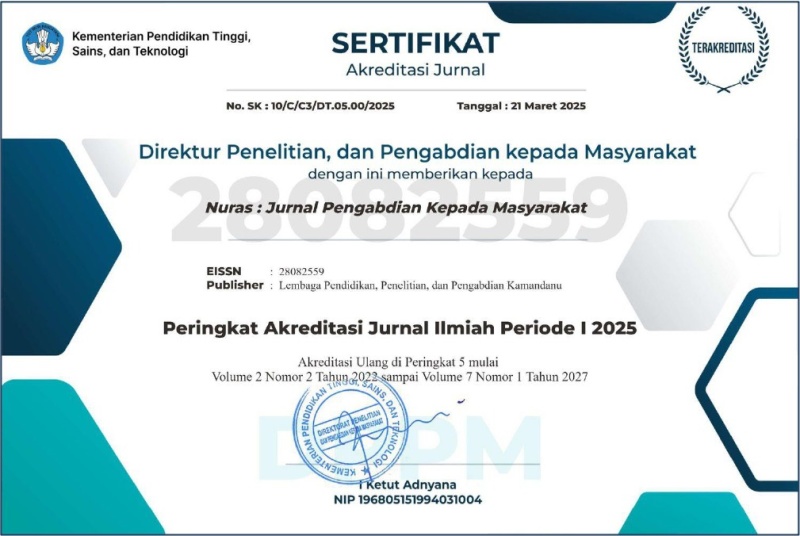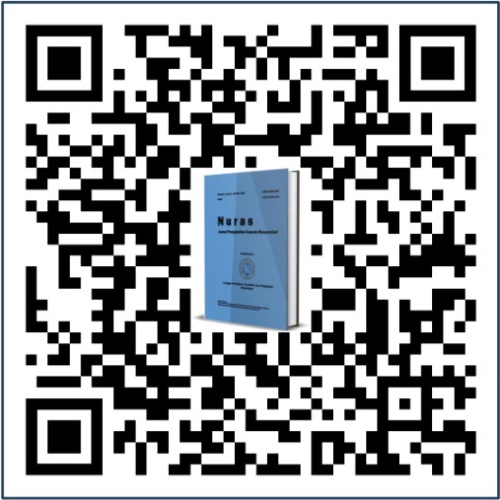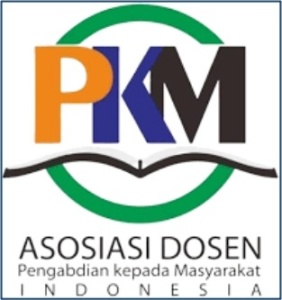Sosialisasi Inovasi Produk Hutan Berkelanjutan: Meningkatkan Nilai Tambah Sumber Daya Alam bagi Mahasiswa Kehutanan
DOI:
https://doi.org/10.36312/nuras.v5i3.459Keywords:
Forest Product Innovation, Environmental Care, Character EducationAbstract
The utilization of non-timber forest products (NTFPs) is still not optimal, despite having great potential in supporting environmental sustainability and the local economy. The need for innovation in forest product management is becoming increasingly urgent, especially in the context of green economic development and natural resource conservation. This activity aims to provide understanding to forestry students of Mandalika University of Education regarding the importance of sustainable forest product innovation, fostering environmental awareness, and instilling character values such as ecological responsibility. This activity involved 30 participants and was carried out in four training sessions that included interactive lectures, group discussions, and individual reflections. The evaluation results showed an increase in participants' conceptual understanding by 42% based on the results of the pre-test and post-test. In addition, participants produced more than 6 creative ideas based on local potential, such as the development of herbal products, environmentally friendly products and natural dyes. Character values such as innovation, ecological responsibility, and environmental awareness were also successfully internalized in the learning process. This socialization makes an important contribution in shaping sustainability awareness and professional readiness of forestry students. It is recommended that this program be continued in the form of applied training that includes the development of NTFP product prototypes and integrated into the green entrepreneurship curriculum.
Downloads
References
Abanina, E., Ustinova, A., & Urkaev, O. (2021). Factors and Conditions for Effective Forestry in the Context of the Transition to Sustainable Development. IOP Conference Series : Earth and Environmental Science, 723(2), 1-6. https://doi.org/10.1088/1755-1315/723/2/022092
Affandi, M., Marijan, K., & Windyastuti, D. (2023). Participatory Budgeting in Indonesia: From the Policy Innovation to the Democracy Innovation. The Journal of Society & Media, 6(2), 527-565. https://doi.org/10.26740/jsm.v6n2.p527-565
Curtis, S., Mozley, H., Langford, C., Hartland, J., & Kelly, J. (2021). Challenging the Deficit Discourse in Medical Schools through Reverse Mentoring Using Discourse Analysis to Explore Staff Perceptions of Under-Represented Medical Students. BMJ Open, 11(12), 1-8. https://doi.org/10.1136/bmjopen-2021-054890
DeLuca, C., Willis, J., Dorji, K., & Sherman, A. (2022). Cultivating Reflective Teachers: Challenging Power and Promoting Pedagogy of Self-Assessment in Australian, Bhutanese, and Canadian Teacher Education Programs. Power and Education, 15(1), 5-22. https://doi.org/10.1177/17577438221108240
Durusoy, İ., & Öztürk, Y. (2022). What are Foresters Taught? An Analysis of Undergraduate Level Forestry Curricula in Türkiye. Sustainability, 14(19), 1-12. https://doi.org/10.3390/su141912568
Fakhruddin, W., Saidalvi, A., Zaid, Y., & Hassan, H. (2021). Enriching Student Knowledge on Sustainable Forest Management Practices by Forestry Professionals: A Look into the Generic Structure Potential of Malaysian Forestry Annual Reports. International Journal of Academic Research in Business and Social Sciences, 11(7), 864-880. https://doi.org/10.6007/ijarbss/v11-i7/10542
Fan, D., & Li, M. (2024). Digital Economy Development and Green Innovation Efficiency from a Two-Stage Innovation Value Chain Perspective. Sustainability, 16(11), 1-20. https://doi.org/10.3390/su16114421
Fitrani, L., Hafidz, M., Muazaroh, M., Iramani, I., & Karyawan, M. (2023). Training and Assistance in the Implementation of Interactive Learning Media and Utilization of Technology by Using the Wordwall Application. Jurdimas (Jurnal Pengabdian kepada Masyarakat) Royal, 6(3), 459-466. https://doi.org/10.33330/jurdimas.v6i3.2269
He, H., Xu, J., Sun, M., Shao, J., Deng, X., & Zeng, L. (2023). Wechat App Combined CBL in Oral Medicine Clinical Training: A Review. Medicine, 102(11), 1-7. https://doi.org/10.1097/md.0000000000033102
Huang, Y., He, X., He, S., & Dai, Y. (2022). Efficiency Evaluation of a Forestry Green Economy Under a Multi-Dimensional Output Benefit in China-Based on Evidential Reasoning and the Cross Efficiency Model. Sustainability, 14(21), 1-25. https://doi.org/10.3390/su142113881
Jiang, C., & Pang, Y. (2023). Enhancing Design Thinking in Engineering Students with Project-Based Learning. Computer Applications in Engineering Education, 31(4), 814-830. https://doi.org/10.1002/cae.22608
Juan, N. (2024). The Mechanism of the Impact of the Digital Economy on Green Technology Innovation. In Proceedings of the 5th International Conference on E-Commerce and Internet Technology (pp. 1-8). Changsha, China: Guangdong University of Finance and Economics.
Li, C., Wan, J., Xu, Z., & Lin, T. (2021). Impacts of Green Innovation, Institutional Constraints and their Interactions on High-Quality Economic Development Across China. Sustainability, 13(9), 1-19. https://doi.org/10.3390/su13095277
Li, L., Li, G., Öztürk, İ., & Ullah, S. (2022). Green Innovation and Environmental Sustainability: Do Clean Energy Investment and Education Matter?. Energy & Environment, 34(7), 2705-2720. https://doi.org/10.1177/0958305x221115096
Liu, Y., Yang, Y., Zhang, X., & Yang, Y. (2024). The Impact of Technological Innovation on the Green Digital Economy and Development Strategies. Plos One, 19(4), 1-20. https://doi.org/10.1371/journal.pone.0301051
Mutia, N., & Admawati, H. (2023). Teachers’ Readiness to Implement the Kurikulum Merdeka in the Natural and Social Science Learning. Al-Bidayah: Jurnal Pendidikan Dasar Islam, 15(2), 267-290. https://doi.org/10.14421/albidayah.v15i2.1044
Nurhidayati, S., Susantini, E., Safnowandi, S., Rachmadiarti, F., & Khaeruman, K. (2022). The Uncovering Environmental Knowledge of Senior High School Students about the Local Potential Area Based on Reviewed from Gender and Grade. In Proceedings of the 2nd International Conference on Education and Technology (ICETECH 2021) (pp. 215-220). Paris, France: Atlantis Press.
Nurhidayati, S., Susantini, E., Safnowandi, S., Rachmadiarti, F., Khaeruman, K., & Sukri, A. (2023). Revealing Students' Environment Care Attitudes Viewed by Different Gender and Departments. In Proceedings of the 3rd International Conference on Educational Technology (ICETECH) (pp. 132-140). Paris, France: Atlantis Press.
Oluwajuwon, T., Mewase, A., Olasuyi, K., Adetula, O., & Adekunle, V. (2023). Perception and Willingness of Private Secondary School Students in Forestry Education and Career: A Case Study from Nigeria. Journal of Natural Resources and Life Sciences Education, 52(1), 1-20. https://doi.org/10.1002/nse2.20095
Priyambada, R., Nompembri, S., & Yulianto, W. (2024). Strategies for Facing Implementation Challenges Independent Learning Curriculum in Subjects Physical Education, Sports and Health in SMAN 6 Yogyakarta. International Journal of Multidisciplinary Research and Analysis, 7(2), 773-776. https://doi.org/10.47191/ijmra/v7-i02-45
Sharma, B., & Devkota, B. (2024). Anti-Alcohol Education in the Secondary Education Curriculum of Nepal. OCEM-JMTSS, 3(2), 112-124. https://doi.org/10.3126/ocemjmtss.v3i2.67876
Sheng, Z., Zhu, C., & Chen, M. (2024). Exploring the Impact of Digital Economy on Green Total Factor Productivity - Evidence from Chinese Cities. Sustainability, 16(7), 1-13. https://doi.org/10.3390/su16072734
Valentine, C., Jamiluddin, J., Wahyudin, W., & Marhum, M. (2023). Developing Students’ Speaking Skill through Small Group Discussion (SGD) Technique. Jurnal Onoma: Pendidikan Bahasa dan Sastra, 9(2), 1601-1608. https://doi.org/10.30605/onoma.v9i2.2895
Vitkovskaya, I., Solovyeva, T., & Ovchinnikova, A. (2021). Strategy to Form Students Positive Motivationt Educational and Project Professional Activities. In Society Integration Education Proceedings of the International Scientific Conference (pp. 766-776). Rēzekne, Latvia: Rezekne Academy of Technologies.
Wang, C., Du, D., Liu, T., Li, X., Zhu, Y., Du, W., Xu, F., Yan, M., & Chen, J. (2024). Environmental Regulations, Green Technological Innovation, and Green Economy: Evidence from China. Sustainability, 16(13), 1-23. https://doi.org/10.3390/su16135630
Wang, Y. (2023). Research on the Impact of Environmental Regulation Based on Marginal Cost on the Development of Green Economy. Economics Studies and Banking Journal (DEMAND), 1(5), 222-233. https://doi.org/10.4108/eai.18-11-2022.2326742
Wibowo, C. (2025). Ekopedagogi Pendidikan Jasmani. Solok: PT. Mafy Media Literasi Indonesia.
Woldt, J., & Nenad, M. (2021). Reflective Writing in Dental Education to Improve Critical Thinking and Learning: A Systematic Review. Journal of Dental Education, 85(6), 778-785. https://doi.org/10.1002/jdd.12561
Zhao, Y. (2024). Research on Community Building in China, from the Perspective of Community Empowerment. Sprin Journal of Arts Humanities and Social Sciences, 3(2), 1-10. https://doi.org/10.55559/sjahss.v3i2.208
Downloads
Published
How to Cite
Issue
Section
License
Copyright (c) 2025 Siti Nurhidayati, Khaeruman, Masiah, & Laras Firdaus

This work is licensed under a Creative Commons Attribution-ShareAlike 4.0 International License.
-
Attribution — You must give appropriate credit, provide a link to the license, and indicate if changes were made. You may do so in any reasonable manner, but not in any way that suggests the licensor endorses you or your use.
-
ShareAlike — If you remix, transform, or build upon the material, you must distribute your contributions under the same license as the original.


















































